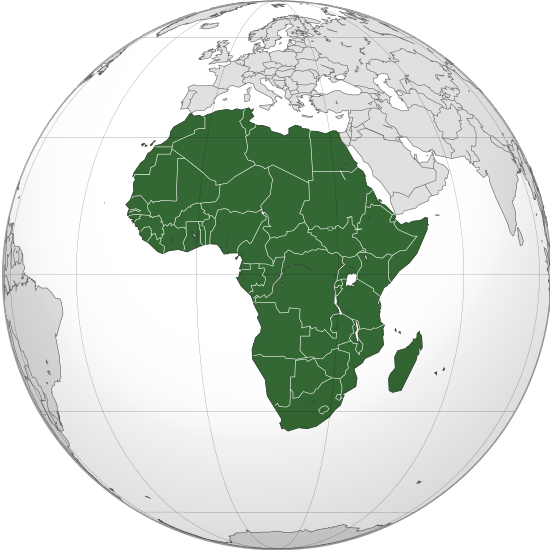Introduction: Defining Africa
Africa is huge, diverse, and complex. Africa is identified as the world's second largest continent, covering more than 30 million square kilometers. Its diversity and complexity extend to its physical geography, climatology, and biogeography. Africa has many vast plateaus, five major basins, long stretches of fertile volcanic mountains not far from desolate wastelands below sea level, lakes that are among the world's largest (Lake Victoria), deepest (Lake Tanganyika), and one of the most rapidly shrinking (Lake Chad), and an array of features famous for their similarly dramatic contrasts. With its great variations in longitude (from 37 1N to 351 S) and topography, Africa is both the most tropical continent and one with extraordinarily diverse and complex climates and life forms.
Equally notable elements of Africa's diversity and complexity appear in its human geography. This landmass is divided into more than 50 countries, and its peoples speak more than 1000 separate languages. Africans divide themselves or find themselves divided into a set of regions. The highest order of division is that between North Africa (countries that lie largely north of the vast Sahara desert) and sub-Saharan Africa (every other country, including – strangely – the countries where much of the Sahara desert can be found, since their southerly and more populated areas are south of the desert in a belt of land referred to as the Sahel). Sub-Saharan Africa is typically subdivided into regions referred to as West Africa, Central or Equatorial Africa, Eastern Africa, and Southern Africa. Further subdivisions of these regions are common, most importantly between Atlantic West Africa and Sahelian West Africa.

The difficulties of categorizing countries in terms of their regional identity give us a clue as to why Africa's diversity and complexity problematize its easy definition as a 'continent'. To divide Africa into regions based on state boundaries ignores the fact that with a few limited exceptions these lines were devised by Europeans in the nineteenth-century colonial conquests, without consulting Africans. The boundaries of today's independent African states ignore preexisting African political divisions of space, many of which still endure in the consciousness of African peoples, often bisecting countries, straddling across two or three states, or leaving one state with dozens of entities that think of themselves as separate nations. Then there is the complex question of where Africa begins and ends, wrapped up in human preoccupations with and misunderstandings of race throughout history. Separating North Africa and sub-Saharan Africa culturally is dubious unless one draws lines simply on the basis of skin color (and even then, things quickly get far more complicated than some simple 'North is white, sub-Saharan is Black' dichotomy). The Sahara has served as a 'sea' (most recently of sand, but over the millennia of human history, of water, or grass, or trees) across which a high volume of economic trade and cultural exchanges flowed for thousands of years.
The idea of 'Africa' gets very fuzzy at its edges. There are a number of island countries that identify with Africa, several of which (notably Mauritius) have majority populations of non African origin. Egypt is identified as a part of the African continent – except then what do we do with the Sinai Peninsula, part of Egypt that is not on the African landmass? A growing African population all across Europe has a history stretching back far longer than most other Europeans recognize or understand. Arab caliphates ruled North Africa and much of Europe's Iberian Peninsula for the better part of eight centuries (while Spain still rules two Moroccan cities as part and parcel of Europe). Most significantly, of course, people of African origins comprise a major proportion of the populations of most countries in North, South, and Central America as well as the Caribbean islands, as a result of the three and a half centuries of the transatlantic slave trade. Typically referred to as the African diaspora, this diverse and complex population, in combination with or separate from smaller populations of diasporic Africans in Europe, Asia, or Oceania, creates, in a variety of forms, its own ideas of 'Africa', and this African presence across the globe leads to an all encompassing expansiveness to the idea of where Africa begins and ends.
Hence, it comes to be that Africa's geography is hard to separate from representations of Africa's geography and the political and ideological uses to which these representations are put. Anglophone geography has itself weighed heavily on this representational politics. The shifts in the ways English language introductory texts have represented Africa over the last century, for instance, are remarkable. The discipline has certainly moved away from depictions of Africa as a Dark Continent, where the Europeans brought light to the darkness through the Christianity, civilization, and commerce of David Livingstone – a depiction quite consonant with the need for justification of Africa's subjugation and exploitation by Europeans and Americans. From this colonialist or colonial apologist geography, through a somewhat less ideologically driven phase of tropical geography, to the ubiquitous development geography of the discipline today, Anglophone geographers have steadily moved toward what is considered 'postcolonial' approaches to Africa. Yet, many introductory texts continue to use sensational representations of Africa that are redolent with the Orientalism of an earlier age, refracted through a geopolitics that remains heavily influenced by the early to mid twentieth century colonial order. It is therefore useful to trace out the deeper historical geography of representations of Africa, in an effort to understand the trajectory that has brought Anglophone geography to this still problematic postcolonial moment in its depictions of the continent.
Representing Africa I: The Early Years
Representing Africa II: Exploration, Colonialism, and Imperialism
(Under)Developing Africa
Postcolonial Africa